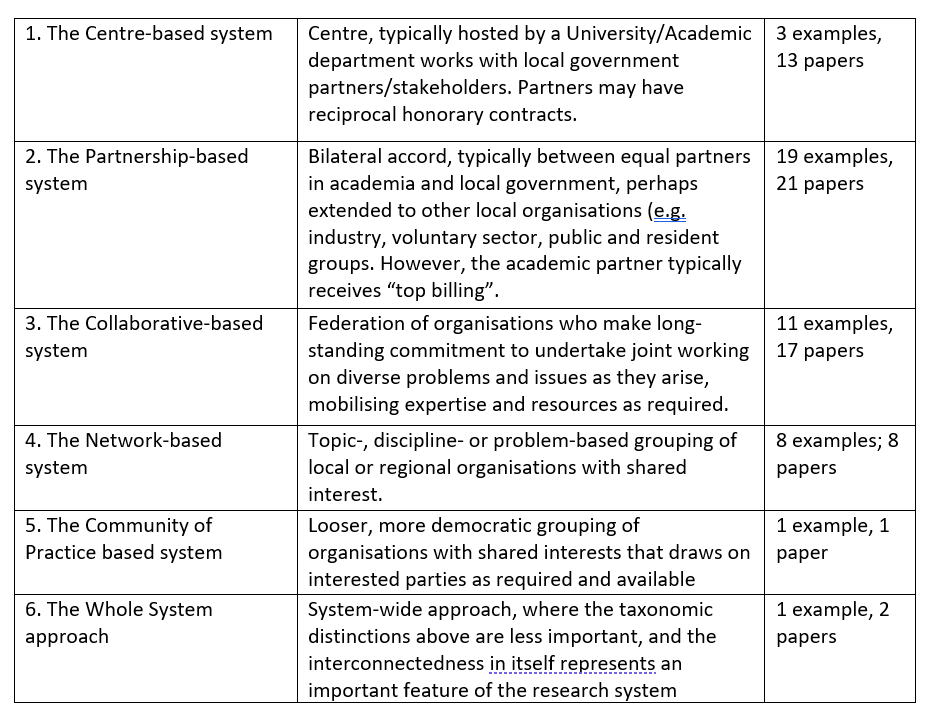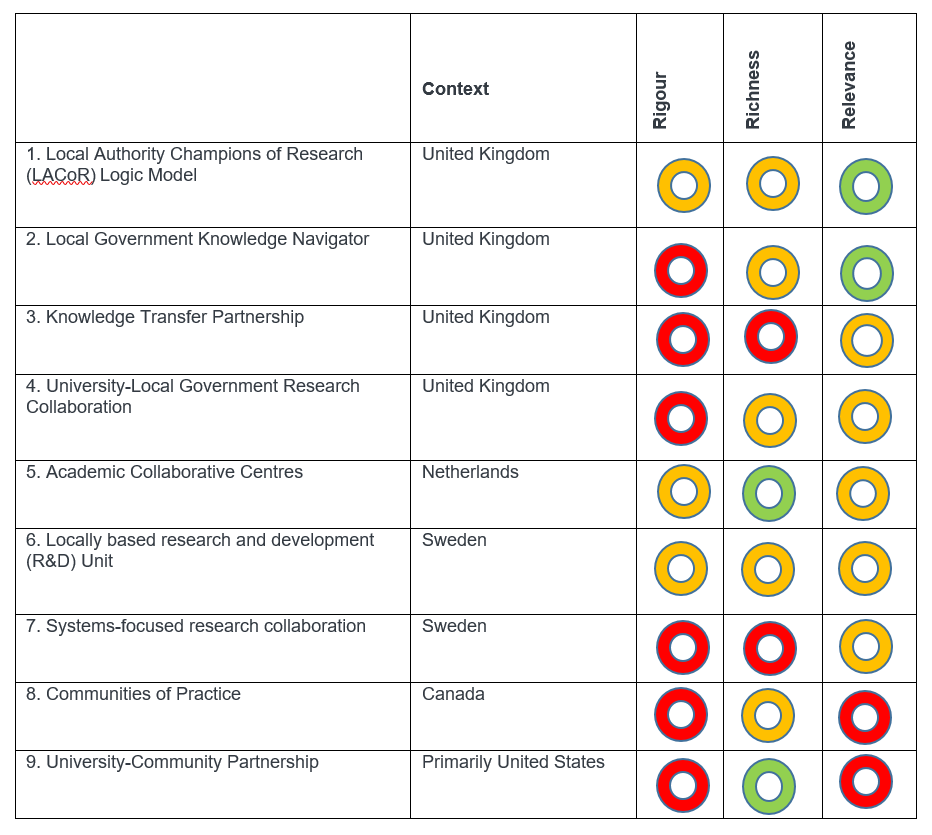
Andrew Booth, Emma Hock and Alison Scope
This blog post is based on the Evidence & Policy article, ‘Examining research systems and models for local government: a systematic review’.
Local government has been unfairly characterised as a black hole when it comes to getting evidence into practice. While it is true that work remains to be done to cultivate interest in research across local government, our recent review found plenty of evidence of academia, local officials and other partners collaborating to make a difference around the generation and use of locally-meaningful research.
What seems to be less common, however, are coordinated approaches to organising research activity within and across an entire local government system. What can we learn from diverse approaches that harness mechanisms across different local government systems?
To explore the richness and variety of existing models, our study asked: What are the characteristics of current models of local authority-based research systems?
We searched across twelve health and social care databases. Our accelerated review enabled us to identify six types of research systems exemplified across thirty-seven included studies.
Which research systems do you recognise?

The above represents a taxonomy; it is neither a hierarchy nor an evolutionary process. Nevertheless, these systems do differ in the extent to which they are able to effect large-scale change and – while the jury is still out – their likely capacity for longer-term sustainability. Furthermore, a whole system approach is unlikely to materialise from nowhere and will, therefore, likely be constructed from multiple co-existing systems. Operating within these research systems are nine specific models that engage with the challenge of developing research capacity within local government. We assessed the written reports of each system for “the three Rs”: rigour, relevance and richness (see Figure 1).

International supermodels?
The nine models itemised above, supported by our assessments of rigour (the quality of evaluation), richness (the level of supporting contextual detail) and relevance (specifically to a UK local government setting) were harvested from multiple geographic contexts. The review’s UK contribution was epitomised in the Local Government Knowledge Navigator, the Knowledge Transfer Partnership and by the University-Local Government Research Collaboration.
Exciting initiatives were derived from the Netherlands (Academic Collaborative Centres), Sweden (Locally based research and development (R&D) Units and a Systems-focused research collaboration) and Canada (Communities of Practice). Conversely, longevity and sustainability was indicated by a plethora of university-community partnerships adapting to multiple locations across the United States in particular. Clearly there is much to be learnt from international comparisons across different local government-research system interfaces.
Sharing a common goal
These international models and approaches vary in their specific focus and structure. All share the goal of bringing together local government practitioners and university researchers to work on common challenges. Benefits identified from such collaborations include:
- Improved evidence-based decision-making in local government
- Enhanced capacity of local government to conduct research
- Increased research impact through application to real-world problems
- Opportunities for professional development for both local government practitioners and university researchers
Closer to home?
Since conducting our review this synthesis has taken on increased topicality with the .
funding of UK Health Determinants Research Collaborations (HDRCs). HDRCs are a type of collaboration between local government and universities that focus on research into the wider drivers of population health and health inequalities. HDRCs are funded by the UK National Institute for Health Research (NIHR) and are based in local government authorities. One of our team and other members of our institutions are involved in delivering one such HDRC in nearby Doncaster, South Yorkshire.
Applying the lessons learnt
The model that particularly resonated, now being explored as our own example of translating our review evidence into our practice, is the Local Authority Champions of Research (LACoR) Logic Model from Cheetham and colleagues. Early activities within Doncaster HDRC map well to many activities on that logic model with many more already being discussed and planned. In turn, our evaluation attempts are informed by a sound theoretical underpinning derived from the LACoR model. Other local authorities are also keen to learn lessons both from the logic model and from our emerging practical experience.
Making an informed choice?
The specific model or approach that is most appropriate response to local challenges in bringing together local government practitioners and university researchers will depend upon multiple factors – the needs of the local government organisation, the research interests of the university, and the availability of funding. However, all of these models and approaches have the potential to deliver significant benefits for both local government and universities. We trust that our review will help planners to navigate through the “black hole” and onwards to productive collaboration.
* Table 1 is not covered by a Creative Commons licence and is not to be reproduced without prior permission from the publisher, Bristol University Press.
Image credit: Photo by Pawel Czerwinski on Unsplash
Andrew Booth, PhD, is a professor in evidence synthesis at the Sheffield Centre for Health and Related Research (SCHARR), University of Sheffield, UK. Andrew has a particular research interest in knowledge management and research capacity development and conducts diverse review types in a variety of health services delivery and public health topics. Contact at A.Booth@sheffield.ac.uk.
Emma Hock, PhD, is senior research fellow at the Sheffield Centre for Health and Related Research (SCHARR), University of Sheffield, UK. Her interdisciplinary research focuses on health behaviour change and physical activity and mental health. Contact at emma.hock@sheffield.ac.uk .
Alison Scope, PhD, is research fellow in the Department of Allied Health Professions, College of Health, Wellbeing and Life Sciences, Sheffield Hallam University, UK. Her research interests cover behaviour change, mental health and developmental disorders. Contact at alison.scope@shu.ac.uk
Read the original research in Evidence & Policy:
Hock, E, Scope, A., and Booth, A. (2023). Examining research systems and models for local government: a systematic review. Evidence & Policy, DOI: 10.1332/17442648Y2023D000000002.
If you enjoyed this blog post, you may also be interested in reading:
Improving evidence use: a systematic scoping review of local models of knowledge mobilisation OPEN ACCESS
Use of research evidence in legislatures: a systematic review OPEN ACCESS
Disclaimer: The views and opinions expressed on this blog site are solely those of the original blog post authors and other contributors. These views and opinions do not necessarily represent those of the Policy Press and/or any/all contributors to this site.